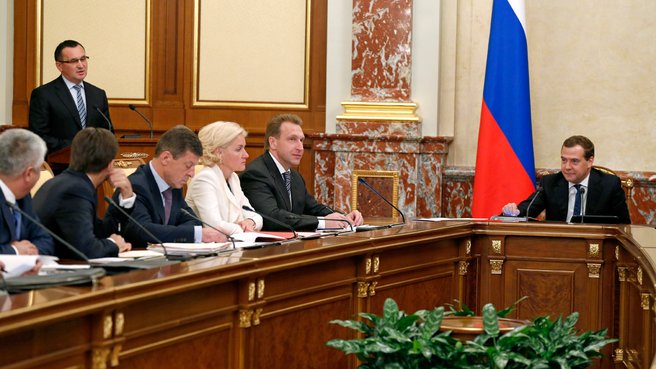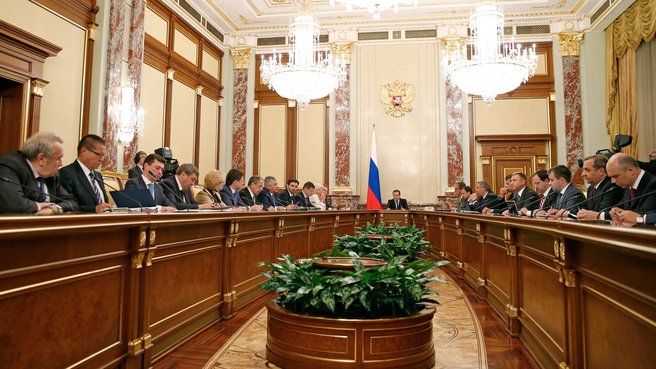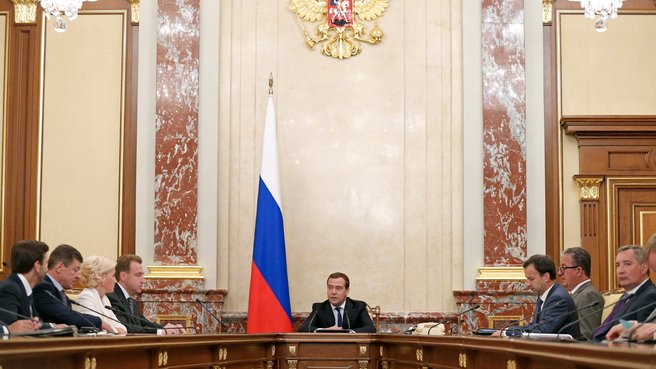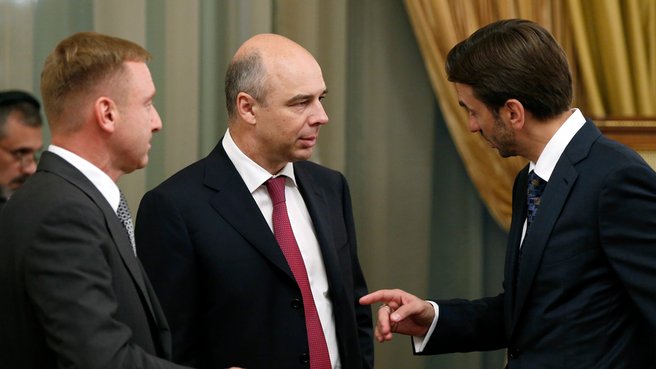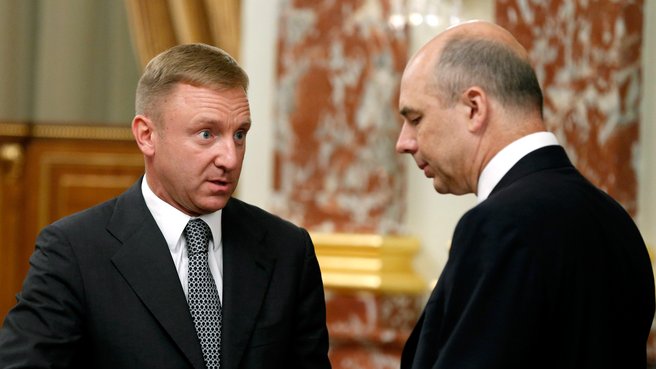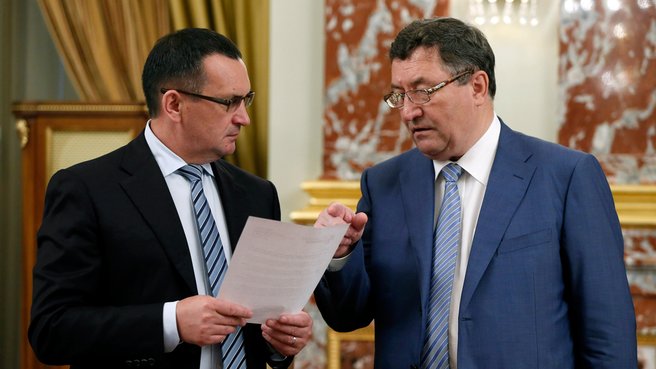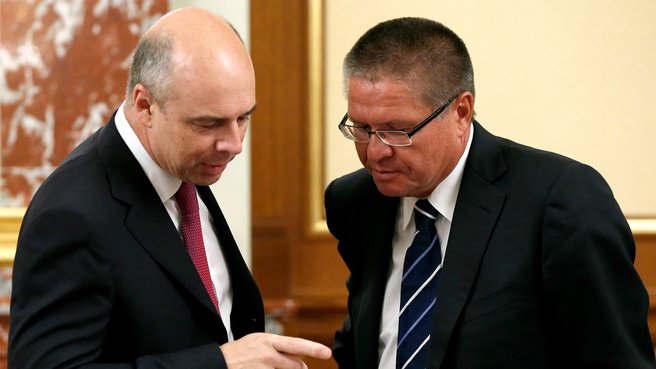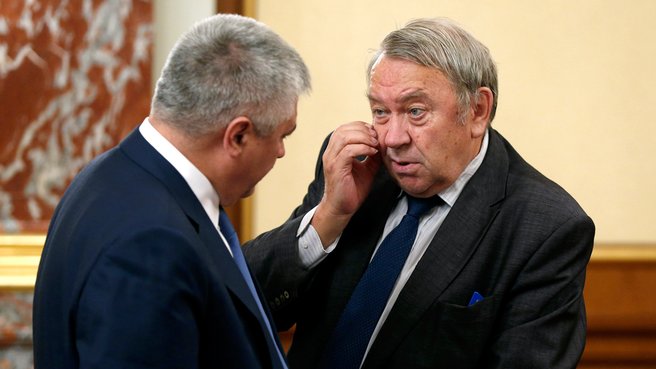Agenda: The draft federal targeted programme The Sustainable Development of Rural Areas for 2014 – 2017 and until 2020, plus 12 other issues
Transcript:
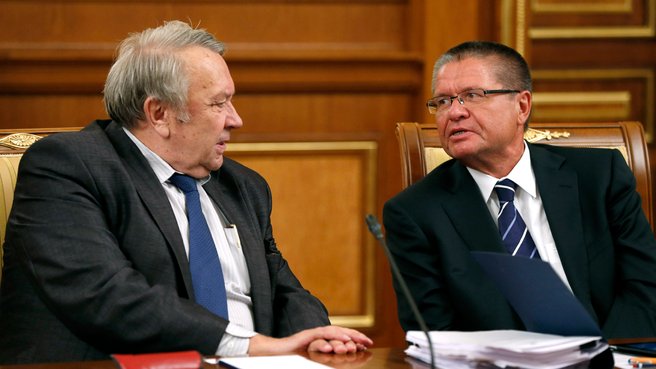
President of the Russian Academy of Sciences Vladimir Fortov and Head of the Ministry of Economic Development Alexei Ulyukayev
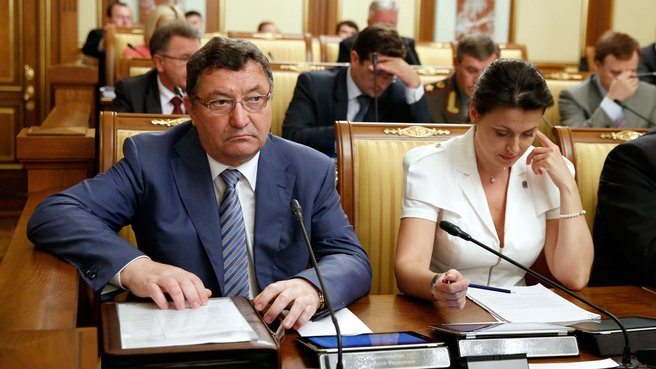
Head of Tambov Region Oleg Betin and Head of the Medical Biology Department at the Siberian Federal University Ekaterina Shishatskaya
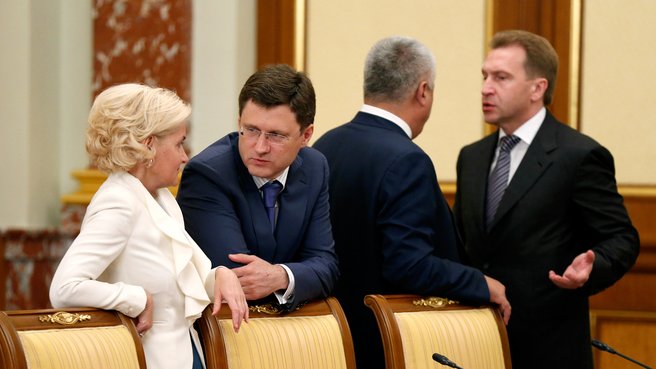
Deputy Prime Minister Olga Golodets, Minister of Energy Alexander Novak, Minister of the Interior Vladimir Kolokoltsev and First Deputy Prime Minister Igor Shuvalov
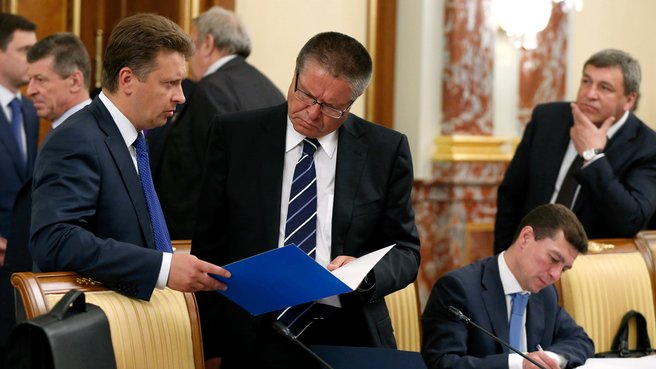
Minister of Transport Maxim Sokolov, Minister of Economic Development Alexei Ulyukayev, Minister of Labour and Social Security Maxim Topilin and Minister of Regional Development Igor Slunyayev

Minister of Communications and Mass Media Nikolai Nikiforov and Minister of Economic Development Alexei Ulyukayev
Minister of Agriculture Nikolai Fyodorov reports at the Government meeting
Dmitry Medvedev: Colleagues, before we get down to business, let me say a few words about the Russian national team’s performance at the World University Summer Games which are currently taking pace in Kazan. As of today, the results for Russia are very good and in fact we have the highest medal count among the 162 teams. Good job! Let’s wish them luck and cheer them on.
As for today’s agenda, it includes some very important issues. First, I want us to discuss the federal targeted programme The Sustainable Development of Rural Areas for 2014 – 2017 and until 2020. This subject has always been of crucial importance for the country and will always require the attention of the Government.
Today, over 37 million people live in rural areas. Our common objective is to create decent working and living conditions in rural areas. This includes better housing conditions, roads, communications, kindergartens, schools, quality healthcare and, of course, social services. All these issues need to be addressed.
Last November, the Government approved the draft concept of a corresponding federal targeted programme. We discussed the programme in detail at a meeting in the Ryazan Region in May. The Ministry of Agriculture prepared the draft project with regard to the results of another targeted programme, The Social Development of the Countryside, which was introduced 10 years ago.
Dmitry Medvedev: "Today, over 37 million people live in rural areas. Our common objective is to create decent working and living conditions in rural areas. This includes better housing conditions, roads, communications, kindergartens, schools, quality healthcare and, of course, social services."
Priority support will be provided to areas engaged in agro-industrial investment projects, the creation of new high-tech jobs and the development of land plots for modern, compact and comfortable housing. There are plans to construct 5.4 million square metres of housing, with 3 million designated for young families and young professionals. As a result, about 42,000 families and young professionals will be provided with housing. So this work will be continued under the new federal targeted programme.
In addition, the programme to connect people to mains gas supplies will be continued as well, as will the construction of new water supply systems. The number of buildings with gas connections is rising, we need to invest more money in that. Special attention will be paid to improving schools, obstetrics and general clinics, as well as the construction of cultural and sports facilities.
Dmitry Medvedev: "The amount of general funding will come to almost 300 billion roubles, with 90 billion coming from the federal budget, 150 billion from the consolidated budget of the regions and some 60 billion from other sources."
New areas of focus include the issuing of grants to local initiatives for developing villages, preserving natural landscapes, and reviving cultural traditions, folk arts and crafts. In all, 775 projects will be funded. The amount of general funding will come to almost 300 billion roubles, with 90 billion coming from the federal budget, 150 billion from the consolidated budget of the regions and some 60 billion from other sources. Regions will receive subsidies from the federal budget. In turn, the regions must prepare their own targeted programmes with regard to the existing territorial planning documents and development prospects for the agro-industrial sector.
Let me speak about one more issue. During our discussion today we are going to consider road maps, or, in other words, a set of measures to develop new industries. We’ll begin with biotechnology and genetic engineering. These areas have been chosen because of modern trends and the role they play in medicine and industry.
Experts predict that by 2025 the biotechnological market will have reached 2 trillion dollars. Investment in relevant projects is being made in the U.S., Europe and Japan. Large-scale programmes related to the full range of biotechnological research and production have been launched in such rapidly developing economies as China, India and Brazil. It would not befit us to lag behind, all the more so as Russia currently accounts for only 0.1% of the global biotechnological market, and over 80% of the relevant products are being imported. We need to change this, by creating conditions for the development of a powerful bioindustrial centre in our country, by promoting research and invention in the fields of bioenergy, biotechnology and agricultural and nutritional biotechnology, and, of course, by paying close attention to the professional expertise and experience of our engineers and technicians.
The strategic goal of the roadmap is to ensure that biotechnological productivity surpasses its current levels by at least ten times. To do that, we, of course, need assistance. I would like to welcome Vladimir Fortov (President of the Russian Academy of Sciences), who is here with us at a Government meeting for the first time as the incumbent President of the Russian Academy of Sciences. Let’s wish him luck.
Let’s get down to work. First we’ll hear a report by Nikolai Fyodorov. Go ahead, please.
Nikolai Fyodorov: Mr Medvedev, colleagues. It was not so long ago that a Russian peasant would commonly say: “Blessed is he, who lives in his own house.” Now the Russian peasant is no longer satisfied with a simple house, he wants, as you have said, Mr Medvedev, a comfortable one. He wants this house to have cold and warm running water, a sewage system, access (and broadband, at that) to the Internet, he wants the house to be easily accessible by transport and, there are regions, colleagues, where people ask for sports facilities, and not just facilities but sports palaces and swimming pools to be located nearby. There are regions where work is in progress to meet such demands. There are not many of them, but the work there is going on. And the rural working people are growing more and more particular about their living and working conditions. This is due to global changes, but it has also been, and I am sure of it, brought about by the measures implemented by the Government .
Nikolai Fyodorov: This year the implementation of the federal targeted programme Social Development of Rural Areas to 2013 is being concluded. The prospects for this year show that more social and utilities infrastructure facilities will be installed. The number of rural residential buildings connected to gas supply lines will go up from 33% at the launch of the programme to 57% by the end of this year. Potable water provision to the rural population will go up from 40.7% to almost 60%.
Let me share one personal recollection, Mr Medvedev. When I came back from Moscow to my native region, we began developing the Strategy for Individual Housing Construction. So we made a survey together with experts, asking people who wanted to build a house and about their needs. I was saddened by what we learned, as only 4% to 17% of those we surveyed mentioned a toilet and a bathroom as part of their housing planning requirements. This was in the mid ’90s. There has been an ocean of change since then, but back then it wasn’t an exceptional case, as this was the situation all over Russia. What I mean to say is that people have become more exigent, and a positive trend like this, which makes our work more complicated, is evident. Our programme today meets these demands to some extent. I think it’s a favourable development, which is good news for all of us and eventually for Minister of Finance Mr Siluanov as well, because the approach at the basis of this programme provides for the all-encompassing development of the agricultural sector and creating favourable working and living conditions in rural areas. This comprehensive approach is what will give us the synergetic, multiplicative effect we all aspire to achieve as members of the Government, if I am not mistaken.
Dmitry Medvedev: No, you can't be wrong on this one. Here, even the Minister of Finance is nodding his approval.
Nikolai Fyodorov: Thank you. This year the implementation of the federal targeted programme Social Development of Rural Areas to 2013 is being concluded, and in accordance with the plans for this year we have to provide 260,000 young families with modern houses or flats, and 90,000 of them are young families and young specialists. The prospects for this year show that more social and utilities infrastructure facilities will be installed. The number of rural residential buildings connected to gas supply lines will go up from 33% at the launch of the programme to 57% by the end of this year. Potable water provision to the rural population will go up from 40.7% to almost 60%.
Nikolai Fyodorov: This year, we continued to support comprehensive construction projects at rural communities. These projects were implemented in 2009 and 2012, respectively, as a separate aspect of the state programme. With account of projects which were launched in previous years and will be completed in 2013, all in all 60 small agro-industrial towns will be built, and they will serve as the main driving force of various agro-business projects.
This year, we continued to support comprehensive construction projects at rural communities. These projects were implemented in 2009 and 2012, respectively, as a separate aspect of the state programme. With account of projects which were launched in previous years and will be completed in 2013, all in all 60 small agro-industrial towns will be built, and they will serve as the main driving force of various agro-business projects. The draft programme which has been unveiled today hinges on the Concept for the Sustainable Development of Rural Territories up to 2020 and the programme concept. Its main goal has been defined, namely, the creation of decent living conditions in the countryside which meet the requirements of the agro-industrial sector in accordance with 21st century standards. A range of measures to expand housing construction and to develop the utilities infrastructure will address specific goals and tasks. Mr Medvedev, this also includes a number of new aspects, which you have already mentioned, such as issuing grants to support local initiatives, which have been drafted, and which are implemented in cooperation with rural residents. This also includes the organisation of nationwide events aiming to preserve and popularise the cultural-historical heritage of the countryside. In reality, all these new things will promote and stimulate additional creative searches for projects linked with the revival of rural communities, with the development of creativity and amateur art, in the good sense of this. They will also create a spirit of competition and rivalry in the countryside, something which we sometimes lack because of certain other difficulties.
With due account for proposals which you discussed and approved after the visits and meetings in the Ryazan Region and the Saratov Region (we have already talked about this), there are plans to proceed from the highly important and modern comprehensive approach towards the development of the social and utilities infrastructure and agro-industrial production in the implementation of programme measures. We will also create a favourable infrastructure environment, which will ensure the implementation of investment projects. At the same time, we must ensure the comprehensive development of rural territories. Therefore all regions and municipal entities claiming the right to receive additional state support will have to draft and approve the relevant mandatory territorial-planning documents. Russian regions are to receive state support by selecting regional programmes on a competitive basis, in line with established criteria.
The financial mechanism of the programme’s implementation stipulates federal, regional and municipal budget allocations, as well as funds from non-budget sources, in accordance with co-financing regulations. The programme prioritises the construction of modern comfortable housing, a major factor for attracting young and highly qualified specialists to rural areas. There are plans to spend almost 142 billion roubles from all funding sources on this. Projects to create comprehensive housing construction sites for rural communities will also be implemented, and they are to receive 33.6 billion roubles. As I have already said, we are talking about agro-industrial towns or villages.
A system of target indicators and planned parameters is stipulated in order to monitor the implementation of the programme and assess its effectiveness.
Nikolai Fyodorov: Plans are in place to further improve housing conditions for 75,500 rural households, including 42,000 young families and young professionals, improve access to social facilities, upgrade the engineering infrastructure, and create about 32,000 new modern jobs.
Nikolai Fyodorov: Plans are in place to further improve housing conditions for 75,500 rural households, including 42,000 young families and young professionals, improve access to social facilities, upgrade the engineering infrastructure, and create about 32,000 new modern jobs.
The draft programme has been agreed upon with all interested parties and the executive authorities, and has been approved by the Government Commission on Agriculture and Fishery, the Public Council under the Ministry of Agriculture and the executive authorities of the Russian regions.
Please support this motion.
Dmitry Medvedev: All right. Let's hear from our colleagues who are engaged in the implementation of the previous programme in the regions. We have Governor of the Tambov Region Mr Betin with us today. Go ahead, Mr Betin.
Oleg Betin: Mr Medvedev, Government members, and meeting participants. The programme under review is a fairly well developed document which, in my opinion, should be supported. Its implementation could lead to a fundamentally new approach to targeted rural development. As you may recall, previously, the Economic Growth Strategy drafted by the State Planning Committee considered exclusively urban areas and industrial production facilities as drivers of economic growth, whereas rural areas, as we know from the documents, were assigned the role of suppliers of raw materials and cheap food. No one has ever been successful in dealing with rural issues using isolated campaigns, so we really need to adopt a comprehensive targeted programme. A few years ago, we in the Tambov Region started working on the comprehensive sustainable development of rural areas based on the experience of the EU countries. In 2006, we developed the 21st Century Village project, and in 2008 signed a memorandum of cooperation with the Ministry of Food, Agriculture and Fisheries of France. Today, we are working together in seven areas. Unlike in Russia, the European system of sustainable development is based on a bottom-up approach. We need time to change the mindset of our people. It would be useful if the federal and regional authorities sat down and developed specific measures for the implementation of the programme under review. I also believe it would be appropriate to provide funding for the construction of compact townships and villages as a priority during the first phase of this programme’s implementation, as Mr Fyodorov mentioned in his remarks, and to create new high-performance jobs there. I believe that this should be a prerequisite during the first phase.
Mr Medvedev, I’d like to ask you to consider including the construction of rural roads into the federal programme for sustainable development of rural areas, for example, beginning 2015. Developing rural territories without improving the transport infrastructure is simply impossible. I believe the law on road funds should be amended. Thus, excise taxes paid by rural people should be used to build motor roads connecting villages and of internal village roads and excise taxes paid by agricultural producers should be used to build access roads to agricultural production and processing facilities. This is a global practice, which significantly reduces loss of produce, boosts service life of agricultural equipment and improves the investment appeal of rural areas.
Poor infrastructure for the construction of new production facilities is a major obstacle in the way of rural development. To overcome it, we could revive the investment fund, which showed outstanding results during the construction of such facilities. I believe that the federal programme for the sustainable development of rural areas to 2020 should be adopted rather than being put on the back burner, since the Russian regions should be ready for its implementation by late 2013. The regions should also adopt their respective programmes and put together the regulatory framework. We still have plenty of time to do this. If we adopt the document today, then the regions will start implementing it right away.
Dmitry Medvedev: Thank you, Mr Betin. We’ll think about the roads, because we have other tools, as well. But since you’ve made this proposal, we will discuss it as well.
Does anyone want to comment or add anything? No questions? No comments, either? Mr Dvorkovich, please go ahead.
Arkady Dvorkovich: We have reviewed the draft federal targeted programme at the Government Commission for the Development of Agriculture and Fishery, approved it, submitted amendments and agreed on them with the Ministry sof Finance. We did find approaches that will promote the social infrastructure in rural areas based on investment projects in rural areas. This will attract skilled labour to these areas.
Dmitry Medvedev: All right. Thank you.
If there are no more questions, I suggest that we adopt this programme and move on to other issues. Agreed then.
<…>
